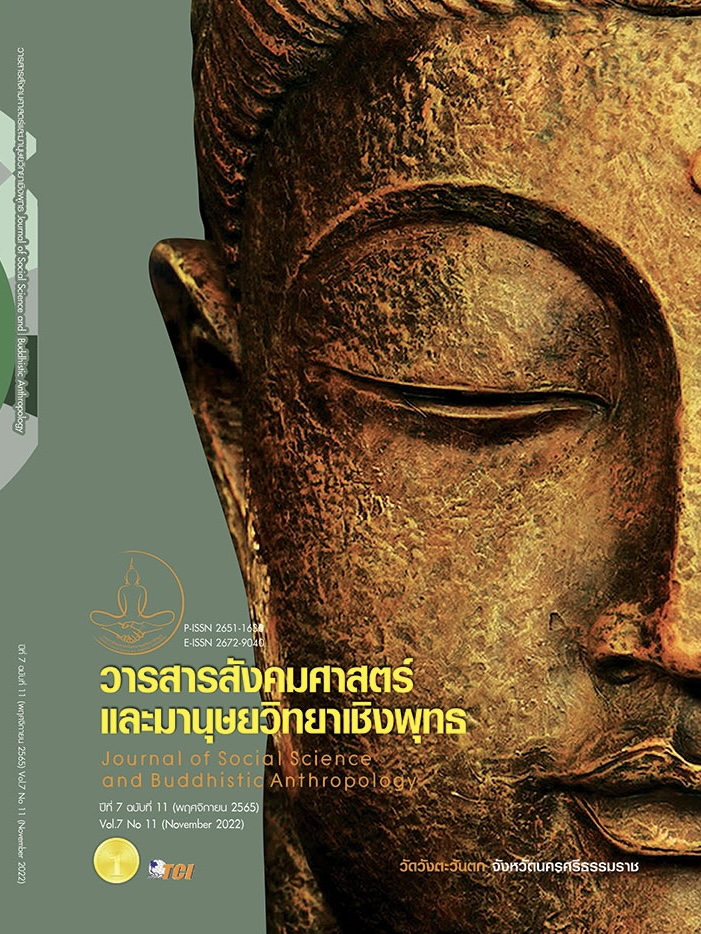THE RESEARCH OF PUNISHMENT SUSPENSION OF BUDDHIST MONK AND SECULAR OF THE CRIMINAL JUSTICE IN THAILAND
Keywords:
Punishment Suspension, Buddhist Monk, Secular, Criminal Justice in ThailandAbstract
The purposes of this article were to: 1) Study punishment of Buddhist monk and secular in punishment accordance of the criminal justice in Thailand, 2) Study punishment suspension of Buddhist monk and secular of the criminal justice in Thailand, and 3. Propose the practice guidelines in punishment suspension of Buddhist monk and secular in practice guidelines of the criminal justice in Thailand. The study was qualitative research by document data analysis, tool is an in-depth interview. Key informant was such as: 1) Buddhist monk, and 2) secular consisting of lawyers, police, public prosecutors, judges and corrections officers of 10 persons, by selecting a specific sample, content analysis and summarize the overview. The research was found that: 1) punishment of Buddhist monk and secular in punishment accordance in case of bad behavior of Buddhist monks, it is usually to restore secular status. Blame any form of monks for violating the criminal law and forcing Brahman's desire and monks to arrest, procedure for judicial proceedings or prosecution is in accordance with the judicial process in the judicial process supported by law. As for the farewell, it is a matter of the sangha's administrative process that depends more on the guilt. and if the court proves it to be false able to return to be ordained as a monk, 2) punishment suspension of Buddhist monk and secular in the principle of democracy guarantees people's rights, freedom and equal constitutional procedures The purpose of this study is to analyze the effectiveness, fairness and non-discrimination of punishment, and 3) Propose the practice guidelines in punishment suspension of Buddhist monk and secular addition: legal provisions should be clear, comprehensive and appropriate.
References
เจ้าหน้าที่ราชทัณฑ์. (18 มีนาคม 2565). การวิเคราะห์การรอการลงโทษพระสงฆ์ไทยและฆราวาสในกระบวนการยุติธรรมไทย. (ประเสริฐ ลิ่มประเสริฐ และพระสิทธินิติธาดา, ผู้สัมภาษณ์)
ชนะรัตน์ ผกาพันธ์. (2560). มาตรการคุ้มครองสิทธิของผู้เสียหายในกระบวนการยุติธรรมทางอาญา ของประเทศไทย. ใน วิทยานิพนธ์นิติศาสตรมหาบัณฑิต สาขาวิชากฎหมายอาญาและกระบวนการยุติธรรมทางอาญา. มหาวิทยาลัยศรีปทุม.
ทนายความ. (20 มีนาคม 2565). การวิเคราะห์การรอการลงโทษพระสงฆ์ไทยและฆราวาสในกระบวนการยุติธรรมไทย. (ประเสริฐ ลิ่มประเสริฐ และพระสิทธินิติธาดา, ผู้สัมภาษณ์)
บุญชม ศรีสะอาด. (2556). วิธีการทางสถิติสำหรับการวิจัย. (เล่มที่ 2). กรุงเทพมหานคร: สุวีริยาการพิมพ์.
ปุระชัย เปี่ยมสมบูรณ์. (2535). รายงานการวิจัยเรื่องการบริหารงานยุติธรรมในระบอบประชาธิปไตย. กรุงเทพมหานคร: สำนักวิจัยสถาบันบัณฑิตพัฒนาบริหารศาสตร์.
พนักงานอัยการ. (24 มีนาคม 2565). การวิเคราะห์การรอการลงโทษพระสงฆ์ไทยและฆราวาสในกระบวนการยุติธรรมไทย. (ประเสริฐ ลิ่มประเสริฐ และพระสิทธินิติธาดา, ผู้สัมภาษณ์)
พระมหาเสาร์คำ ธมฺมธีโร และภัสนันท์ พ่วงเถื่อน. (2563). หลักธรรมาภิบาลในกระบวนการยุติธรรมของคณะสงฆ์ในจังหวัดชลบุรี. วารสาร มจร สังคมศาสตร์ปริทรรศน์, 9(1), 135-147.
ศรีลา ทองกลาง. (2563). ร่างพระราชบัญญัติค่าตอบแทนผู้เสียหายและค่าทดแทนและค่าใช้จ่ายแก่จำเลยในคดีอาญา. เรียกใช้เมื่อ 5 มกราคม 2563 จาก www.polsci. chula.ac.th/sumonthip
สมบัติ ชัยวณิชย์. (2563). ปัญหาในการลงโทษให้เหมาะสมกับบุคคล. วารสารสังคมศาสตร์และมานุษยวิทยาเชิงพุทธ, 5(9), 278-265.
สุชาติ ประสิทธิ์รัฐสินธุ์. (2546). ระเบียบวิธีการวิจัยทางสังคมศาสตร์. กรุงเทพมหานคร: บริษัทเฟื่องฟ้า พริ้นติ้ง.
สุพิชฌาย์ ศิริวัฒนา สีตะสิทธิ์. (2558). แนวทางที่เหมาะสมในการลงโทษและแก้ไขฟื้นฟูผู้กระทำผิดซ้ำในกระบวนการยุติธรรมไทย. ใน ดุษฎีนิพนธ์นิติศาสตรดุษฎีบัณฑิต สาขาวิชานิติศาสตร์. สถาบันบัณฑิตพัฒนบริหารศาสตร์.
สุมนทิพย์ จิตสว่าง. (2563). เอกสารประกอบคำบรรยาย “อาชญาวิทยา”. เรียกใช้เมื่อ 5 มกราคม 2563 จาก www.polsci.chula.ac.th/sumonthip
อัษฎางค์ เชี่ยวธาดา. (2549). ความร่วมมีอระหว่างองค์กรกระบวนการยุติธรรมต่อกรณีข้อมูลชาวสารเพื่อประสิทธิภาพการป้องกันปราบปรามอาชญากรรม. กรุงเทพมหานคร: วิทยาลัยการยุติธรรม สถาบันพัฒนาข้าราชการฝ่ายตุลาการศาลยุติธรรม สำนักงานศาลยุติธรรม.
อำนาจ เนตยสุภา. (2563). สาระสำคัญของการแก้ไขประมวลกฎหมายวิธีพิจารณาความอาญา. เรียกใช้เมื่อ 5 มกราคม 2563 จาก www.ago.go.th/bykanongdetch/viaya.html
Aker, R. L. (1955). Criminological Theories: Introduction and Evaluation. Los Angeles: Roxbury Publishing Company.
Downloads
Published
How to Cite
Issue
Section
License
Copyright (c) 2022 Journal of Social Science and Buddhistic Anthropology

This work is licensed under a Creative Commons Attribution-NonCommercial-NoDerivatives 4.0 International License.









